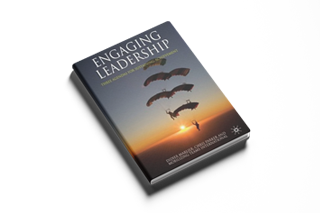I recently asked Chat GPT what it considered to be the best, between Cognitive Diversity and Polarisation. Its reply was: “Cognitive diversity refers to the variety of perspectives, knowledge, and abilities that different individuals bring to a group or organisation. It can lead to better decision-making and problem-solving because different perspectives can help to identify and evaluate a broader range of options.
Polarisation, on the other hand, refers to the separation of opinions or beliefs into two distinct groups, with little or no middle ground. It can lead to a lack of compromise and an inability to find common ground.
In general, cognitive diversity is considered to be more beneficial than polarisation, as it allows for a wider range of ideas and perspectives to be considered, whereas polarisation can lead to a lack of collaboration and an inability to find solutions to problems.”
Seeking to illustrate Chat GPT Artificial Intelligence and with no intention to enter the emotionally mined political field, simply at the title of reflection (I will let you respond for yourself), do you think that, after a wave of Polarisation, Brazil, United Kingdom and United States are better off or did they impoverish themselves as Nations?
I was speaking with one of our new partners today, Elsa de Saignes, a French woman based in New-York City. For her, polarisation is an extreme format of what business knows since a long time under the name of cloning, cooptation, old boys bands from the same school, region, party etc., an incestuous relationship aiming at minimising frictions, dissension, fear of the unknown or loss of control and power.
LBS professor, Lynda Gratton, Talks about Bonding (based on identifying a common enemy, in order to hide our lack of a common purpose) and Bridging (which aims at creating Cognitive Diversity). She warns that Bonding is easier, seems better than the hard work of Bridging but creates far more damage and lower performance.
In 2001, psychologists Baumeister, Bratslavsky, Finkenauer and Vohs, ran a thorough literature search to “review evidence pertaining to the general hypothesis that bad is stronger than good.” And they found all sorts of evidence in areas such as how we react to events (“Bad events produce more emotion, have bigger effects on adjustment measures and have longer lasting effects”), relationships (quoting Gottmann ”in order for a relationship to succeed, positive and good interactions must outnumber the negative and bad ones at least five to one”) etc. This suggests that those supporting Cognitive Diversity are on for a colossal uphill battle against those depicting “others” as Evil, not worth our trust etc. In business, this suggests that leaders who have a positive, hopeful and constructive vision of the future, or simply suggest to “roll our sleeves up to save this company” also fight an uphill battle against the negativists, defeatists, cynics and naysayers. Defeating them is feasible, as Gottmann suggests and is costly in energy.
I also can think of what we call the “three brains theory”, emerging from a blend of the works of American neuroscientist, Paul MacLean (Triune Brain), French “genius” (he was all together surgeon, neurobiologist, writer and philosopher) Henri Laborit and successful American author, Daniel Goleman: Our animal brain (Reptilian brain) constantly scrutinises our environment in search of a potential threat to our Survival (the job, for the “Homo Corporatus”), Territory (Pride, Ego) and Habits. When there is a perception of threat, a message is sent to the Limbic brain (centre of emotions) which immediately responds by a Defence Mechanism (Fight, Flight, Freeze or F….). And, in order to ensure that nothing gets in the way of that reaction, our Neo-Cortex (the part of our brain hosting our rationale self, our capacity to be creative or take measured risks) is switched off (emotionally hijacked for Goleman) by the stress hormone called cortisol. When reflecting on this model, I can perfectly relate this to myself, when I go into “polarisation mode” instead of building Cognitive Diversity.
A lot of this may amount to the question: Am I, as a leader, ready to put myself in danger, and encourage diverse opinions to emerge, feedback to be offered, difficult conversations, postponed for so long, to finally be put on the table?
And this is way more difficult than dictating from Corporate HR that all the organisation’s management teams should be at gender parity…
Two of the best thinkers adapting “Complex Adaptive Systems” theory to leadership and organisation are Meg Wheatley and Myron Kellner-Rogers. In an 1996 article, already, they shared their observations about those systems and concluded: “It is astonishing to see how many of the behaviours we fear in one another dissipate in the presence of good relationship…” For them, there were three conditions for that (of which I draw a strong parallel to Cognitive Diversity):
- The more access people have to one another, the more possibilities there are
- People need opportunities to “bump up” against others in the system, making the unplanned connections that spawn new ventures or better integrated responses
- Without connections, nothing happens…
Cognitive Diversity offers far better results than polarisation. Polarisation is a human reaction, driven by fear (of those who are different to me) and laziness (to build the necessary bridges towards them.) It takes conscious, behavioural, hard work for leaders to create a culture of Cognitive Diversity. It requires a focus on the means/how to (Inclusion) rather than choosing the easy way out, ending up in the wrong results (Diversity at all cost, forcing gender, race, sexual preference parity, too often at the expenses of those we wanted to be fair with).
Many of you have probably seen this, as it comes back on LinkedIn, these days: to me, it symbolises the thoughts of Wheatley and Kellner-Rogers: “It is astonishing to see how many of the behaviours we fear in one another, dissipate in the presence of good relationships.”
Enjoy your leadership journey, the Falls and Recoveries that accompany it. Leadership is an art.




0 Comments